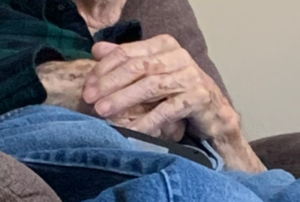 I have always admired my dad’s hands. They seem a little large for his body, they have visible tendons running to each finger and a network of veins going in all directions. They are strong. When he and I participated in a zoom meeting to assess him for his long-term healthcare insurance, the representative asked me to shake hands with him. She then asked if it was a firm handshake, I said, “Yes, indeed.” He can no longer stand or walk, but he could probably still bring me to my knees with a handshake if he were so inclined.
I have always admired my dad’s hands. They seem a little large for his body, they have visible tendons running to each finger and a network of veins going in all directions. They are strong. When he and I participated in a zoom meeting to assess him for his long-term healthcare insurance, the representative asked me to shake hands with him. She then asked if it was a firm handshake, I said, “Yes, indeed.” He can no longer stand or walk, but he could probably still bring me to my knees with a handshake if he were so inclined.
They are the hands of a laborer, though he was not a laborer. He could swing a framing hammer or a sledge hammer or an axe all day long. He was indefatigable when it came to manual labor, even though the tools of his trade were books and words. He’s a Baptist preacher. Has been since age 19. He officially retired 4 years ago at the age of 93, but he still considers that his calling.
Those hands have shaken hands with tens of thousands of people. Many of those handshakes were at the door after Sunday church services, greeting members who thanked him for his sermon. When a visitor came through the line, he shook their hand, asked them their name, where they lived, and did they need a church home. If so, he had a place for them. He greeted friends and strangers with the same strong handshake, a smile, and a personal greeting or inquiry.
He is from the generation that preferred handshakes to hugs, the ones who were young children during the Great Depression and young adults during World War II. Though dad was not in military, he had the same skill, daring, and inventiveness as many of those who were. He seemed to never be afraid to tackle something that needed building or fixing. He and his generation grew up before we became a disposable society, so in order to save a buck, things had to be repaired. The men of that era seemed to live by the motto, “if you can’t fix it yourself, you probably shouldn’t own it.”
Everything in our house growing up had been taken apart and repaired by those hands. He tackled electrical, plumbing, framing, concrete, glass replacement (from the many baseballs that sailed through), broken furniture, broken appliances. You name it, he probably fixed it, or at least tried. His priority was making it work. It did not matter much to him how it looked. When I was helping him get his house ready to sell a few years ago, he patched a noticeable hole in a white wall with a flour and water mixture, let it dry, and then painted over the patch with pink paint. It looked awful. That might be attributable to his failing eyesight, but it was also something he would do. “There, that will work” seemed to be his final word in many such projects.
This past week, my family and I admitted dad to a skilled nursing facility. After a few falls, he was no longer able to manage on his own. His bones are strong enough that he has not broken anything, but his muscles and balance are gone. His memory and reason are drifting away as well. His grip remains.
Last night, after an orderly had helped him go to the bathroom and gotten him into bed, I tucked his covers around him and told him I’d be “over there in your recliner if you need me.” He asked to be turned on his side. I helped him move. He then said, “My back is really hurting. Would you rub it just a minute.”
I started on his lower back where mine usually hurts.
“Higher up.”
I went to the middle of his back.
“Higher up.”
I rubbed up and down between his shoulder blades and he groaned a good groan,
“That’s it.”
I rubbed the muscles on both sides of his spine for a few minutes until he said, “That’s good. Thank you.”
As I patted him good night, he said, “You have strong hands.”
I had to take a breath, and replied, “I got them from you.”
3 Comments until now
What wonderful memories and what a wonderful tribute to your dad! Love your family!
Thank you John for writing this and sharing this. You have me in tears. This is a beautiful tribute to your father and to yourself. I’ve been having a difficult time looking at my hands lately and seeing them with arthritis and veins and losing their strength. I see my mothers hands and both of my grandmother’s hands in my hands and I’ve been lamenting the condition of my hands. But thanks to your words and thoughts now I can see something deeper and long lasting in them. I’m going to work on honoring my hands and where I got them and what they have accomplished. Thank you, dear friend, for sharing.
John, this is beautiful. What a loving tribute to your father. I’m glad he could see you share his hands and all the love and care that emanated from them. I was deeply touched by your love and kindness.
Add your Comment!